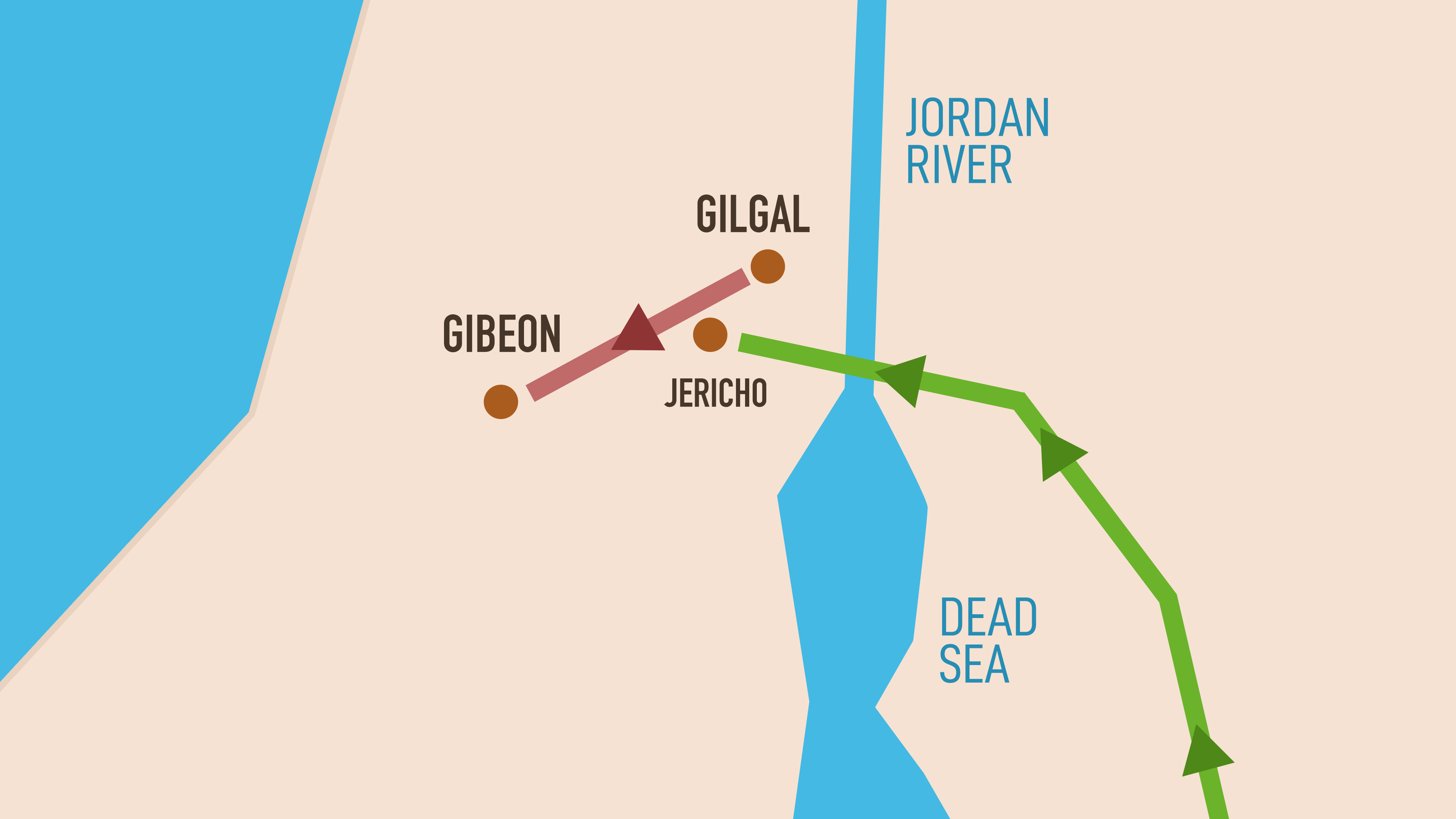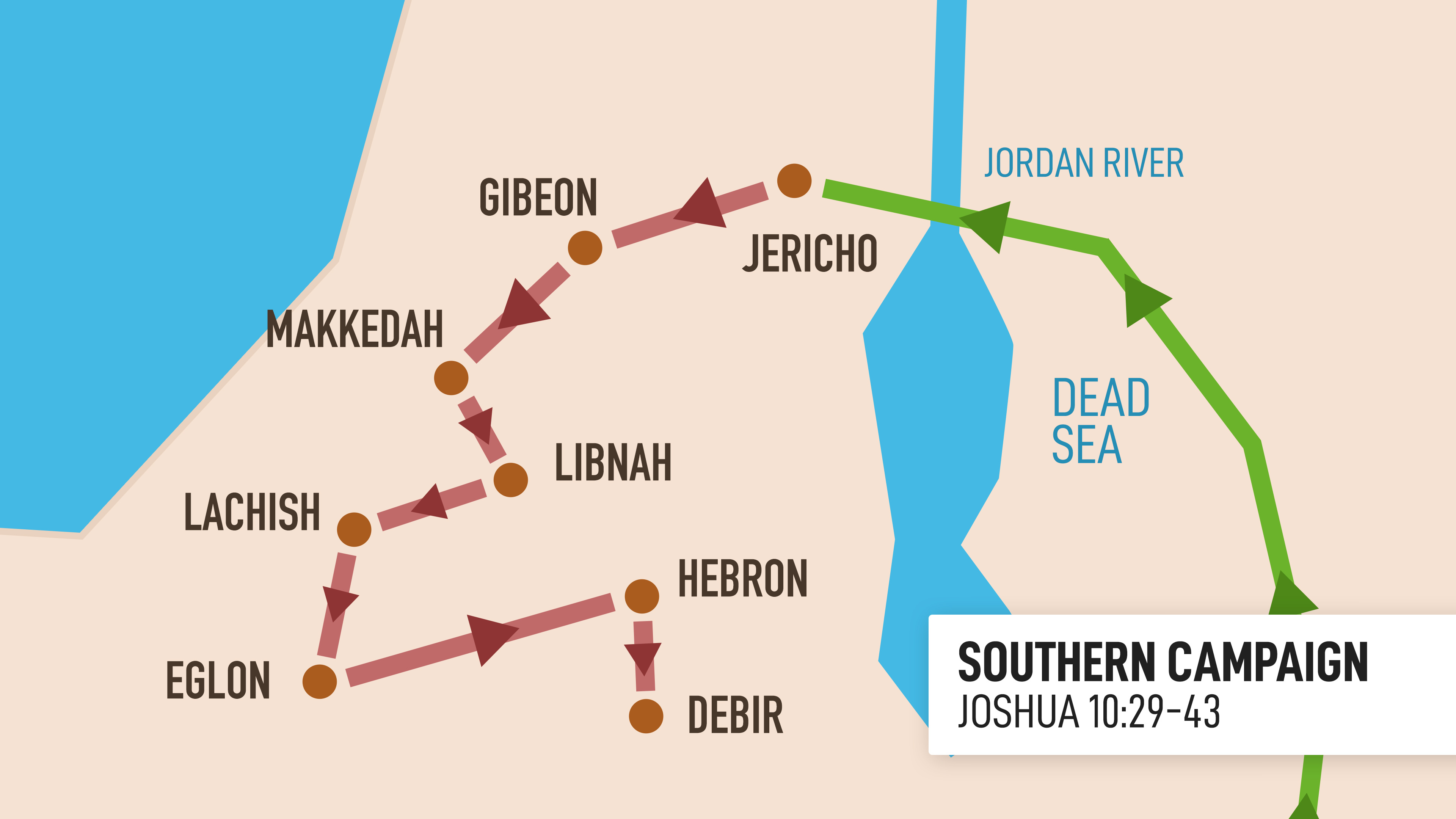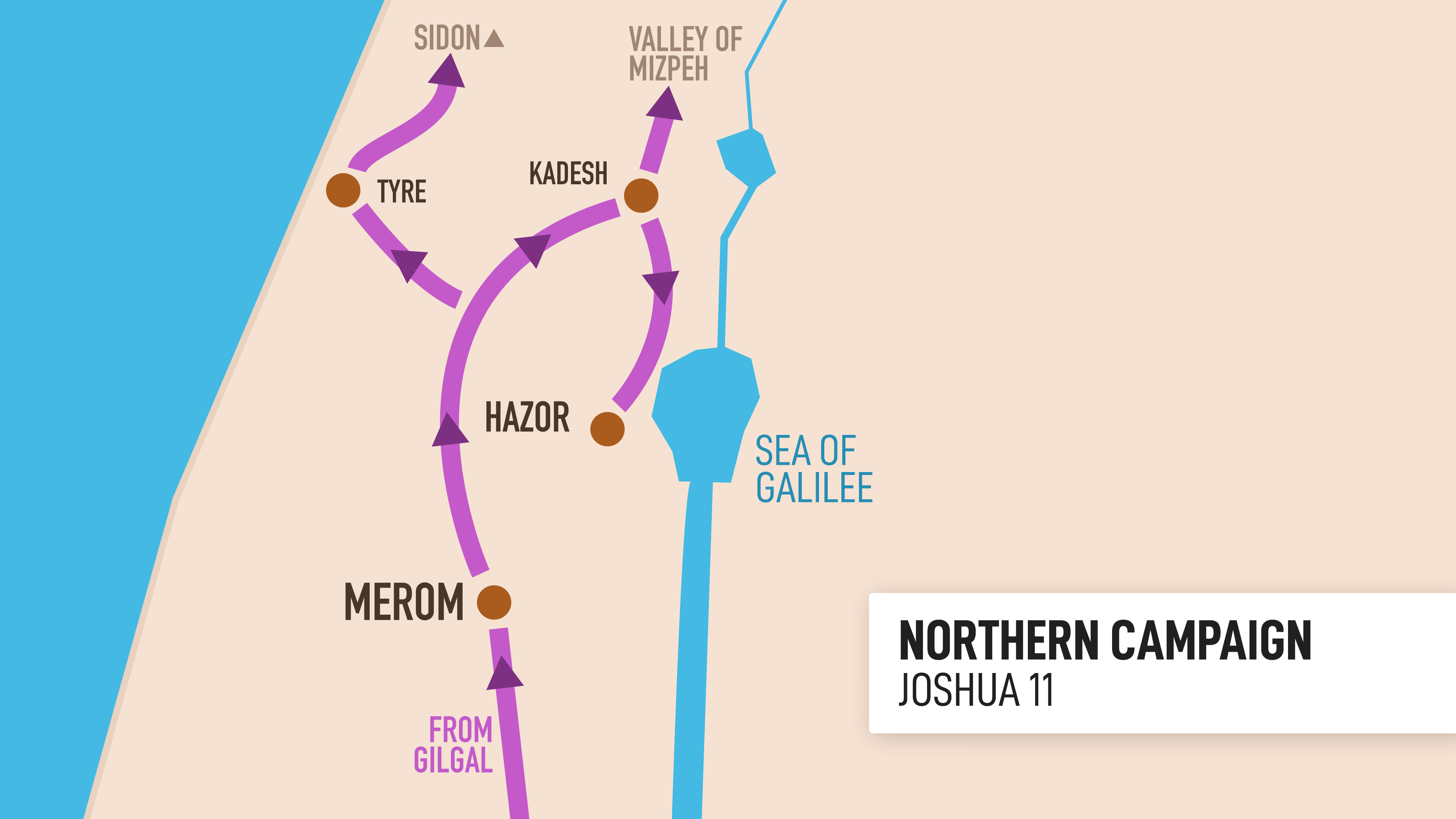Southern and Northern Campaigns
So far in their quest to claim the Promised Land, the Israelites have conquered and destroyed a key city, Jericho, as well as the lesser city of Ai. Jericho was an easy victory as the Jewish people defeated the city through God's miraculous assistance in the form of the city walls crumbling and giving their army easy access to the city and a quick and decisive victory.
The city of Ai, however, proved more difficult, not because of superior forces but because one of the Jews (Achan) had kept clothing and gold against God's command that no spoil was to be taken from the conquered cities. We know that because of this one sin, their effort to take the city was defeated until the disobedience was revealed and dealt with.
Once done, God provided Joshua with an elaborate battle plan that gave them a decisive victory over the city and people of Ai who were part of the nation of the Canaanites.
After their conquest of Ai, Joshua builds an altar on Mt. Ebal (according to Moses' instruction in Deuteronomy 27:2-8). This act of worship serves several purposes for the people:
- It renews the covenant with God as the people pledge their obedience to His Law.
- The people also acknowledge the seriousness of obedience to God's Law which maintains their safety and blessings.
- By including everyone in this national period of worship (men, women, children as well as proselytes to the Jewish faith) Joshua was promoting a national identity of these people as a nation devoted to God.
- With their sacrificial offerings the people also express their gratitude for their victories and their reliance on God for their continued success and protection.
This is a spiritual, emotional and national high point for the Israelites in their early stages of taking possession of the Promised Land. There is much more work and many more battles that lie ahead before they can be completely settled.
Chapters 9 to 12 will detail their efforts to claim land in both the northern and southern parts of the country. But first, there is the unusual story of the deception by the Gibeonites, who were from the city of Gibeon and part of the Hivite nation.

I. Deception by the Gibeonites
In Joshua chapter 9, the Gibeonites, a group of people from the Hivite nation living in the land of Canaan, heard about the conquests of Israel under Joshua's leadership, specifically the destruction of Jericho and Ai (Joshua 9:3). Fearing for their lives, they devised a plan to deceive the Israelites into making a peace treaty with them.
The Deception (Joshua 9:1-27)
The Gibeonites pretended to be ambassadors from a distant country. They wore old, worn-out clothes and sandals, and carried moldy bread and cracked wineskins, creating the appearance that they had traveled a great distance (Joshua 9:4-5). They approached Joshua and the leaders of Israel at their camp in Gilgal, requesting a covenant of peace, claiming they had come from a far-off land (Joshua 9:6). The Israelites questioned them but, convinced by their appearance and story, they did not consult God before agreeing to the treaty (Joshua 9:7-15).
Major Errors by Israel
1. Failure to Consult God (Joshua 9:14)
The most significant error made by the Israelites was that they did not seek God's guidance in this matter. They relied solely on their own judgment and the appearance of the Gibeonites, which led them to make a hasty decision.
2. Assumption Based on Appearances
The Israelites assumed that the worn-out clothes and stale provisions were genuine evidence of the Gibeonites' story, rather than questioning their intentions more thoroughly. This reliance on outward appearances without further investigation contributed to their deception.
Long-Term Consequences for Israel
1. Obligation to Honor the Treaty (Joshua 9:16-21)
Three days after making the treaty, the Israelites discovered that the Gibeonites were actually their neighbors, living within the land of Canaan (Joshua 9:16-17). Despite the deception, the leaders of Israel decided to honor the covenant they had made, fearing the wrath of God if they broke their oath (Joshua 9:18-20).
2. Gibeonites as Perpetual Servants (Joshua 9:21-27)
As a consequence, the Gibeonites were made servants, specifically as woodcutters and water carriers for the community and the altar of the Lord (Joshua 9:21-27). This arrangement persisted for generations and integrated the Gibeonites into the daily life and religious practices of Israel, although in a subordinate role.
3. Long-Term Conflict and Tensions
The presence of the Gibeonites within Israel led to future tensions. In II Samuel 21, many years later, King Saul violated the treaty by attempting to annihilate the Gibeonites, bringing a famine upon Israel as divine punishment. This incident shows the lasting impact of the covenant and the consequences of failing to uphold it.
This episode highlights the importance of seeking divine guidance and the potential consequences of decisions made without it, demonstrating how an error in judgment can have lasting repercussions for a nation.
II. Conquests – South and North (Joshua 10:1-11:23)
The book of Joshua describes the military campaigns led by Joshua as the Israelites conquer the land of Canaan. The conquests are divided into southern and northern campaigns, detailing how Israel defeated various Canaanite kings and took control of the Promised Land.
1. The Southern Campaign (Joshua 10)

The Battle of Gibeon (Joshua 10:1-15)
- Event: The king of Jerusalem, Adoni-Zedek, fearing the alliance between Israel and Gibeon, formed a coalition with four other Amorite kings (Hebron, Jarmuth, Lachish, and Eglon) to attack Gibeon.
- Israel's Response: The Gibeonites sent word to Joshua, asking for help. Joshua and his army marched overnight from Gilgal to Gibeon.
- Miraculous Victory: The Lord threw the Amorite armies into confusion, and Israel defeated them. God also sent hailstones that killed more of the enemy than the Israelites did by the sword. Joshua prayed, and the sun stood still over Gibeon, prolonging the day until Israel achieved complete victory (Joshua 10:12-14).
The Defeat of the Southern Coalition (Joshua 10:16-28)
After Joshua's miraculous victory at Gibeon, where God caused the sun to stand still and sent hailstones upon the fleeing Amorite armies, the five kings of the Amorite coalition realized their defeat was imminent. These kings were:
- Adoni-Zedek, king of Jerusalem
- Hoham, king of Hebron
- Piram, king of Jarmuth
- Japhia, king of Lachish
- Debir, king of Eglon
These kings represented some of the most powerful city-states in southern Canaan. Fearing for their lives, they sought refuge together in a cave at Makkedah.
Joshua's Strategic Decision
When Joshua learned that the kings were hiding in the cave, he ordered his men to seal the cave with large stones and to post guards at its entrance. This action was strategic—by trapping the kings in the cave, Joshua could continue the pursuit of the remaining Amorite forces without delay, ensuring that the armies of these kings were completely destroyed.
Completion of the Battle
After the Israelite forces had finished defeating the Amorite armies and ensuring that none of them survived, Joshua returned to Makkedah. He then ordered the cave to be unsealed and had the five kings brought out.
Execution of the Kings
Joshua commanded that the five kings be executed. Before they were killed, Joshua instructed his commanders to place their feet on the necks of the kings, symbolizing complete subjugation. This act was intended to encourage the Israelites, showing them that God was giving them victory over their enemies.
The kings were then killed and their bodies were hung on trees until evening, a common practice in ancient times to publicly display the defeat of enemies and to serve as a warning to others. In accordance with the law stated in Deuteronomy 21:22-23, their bodies were taken down at sunset and thrown into the cave where they had initially hidden. The entrance of the cave was sealed with large stones, which remained there as a memorial of the victory.
Significance
This event demonstrated several key themes:
- God's Sovereignty and Support: The defeat of the kings, especially with divine intervention through miraculous events like the hailstorm and the extended day, showed that God was directly involved in Israel's conquest.
- Symbol of Total Victory: Placing their feet on the necks of the kings and hanging them on trees was a powerful symbol of Israel's total dominance over its enemies, reinforcing the idea that no power could stand against God's chosen people.
- Encouragement to Israel: This public display served to embolden the Israelites, giving them confidence that they could overcome any obstacle with God's help.
The capture and execution of the five kings of the Amorite coalition marked a turning point in the southern campaign, leading to the subsequent conquest of the remaining cities in the southern region of Canaan.
The Southern Conquests Continue (Joshua 10:29-43)
Cities Conquered:
- Makkedah: After executing the five kings, Joshua took Makkedah, killing everyone there and dedicating the city to destruction.
- Libnah: Joshua then moved to Libnah and conquered it similarly.
- Lachish: Israel moved against Lachish and conquered it in two days. The king of Gezer came to help Lachish but was also defeated.
- Eglon: Eglon was next, and Israel conquered it in a single day.
- Hebron: Israel then turned to Hebron, capturing it and putting everyone to the sword.
- Debir: Finally, Joshua took Debir and destroyed it completely.
Summary of the Southern Campaign
Joshua and the Israelites conquered the entire southern region, defeating all the kings and their cities. They captured and utterly destroyed the inhabitants, following the Lord's command given through Moses. The southern campaign concluded with Israel firmly in control of the southern part of Canaan.
2. The Northern Campaign (Joshua 11:1-23)

The Coalition of Northern Kings (Joshua 11:1-5)
Jabin, king of Hazor, heard of Israel's southern victories and formed a large coalition of northern kings. These included kings from Madon, Shimron, Achshaph, and others from the northern hill country, the Jordan Valley, and regions near Mount Hermon. The combined forces were vast, with many troops, horses, and chariots.
The Battle at the Waters of Merom (Joshua 11:6-9)
The Lord instructed Joshua not to fear the vast army, promising victory. He commanded Joshua to hamstring their horses and burn their chariots.
Israel's Victory: Joshua launched a surprise attack on the coalition at the Waters of Merom. The Lord delivered the enemies into Israel's hands, and they pursued them until none were left alive. Joshua obeyed God's command, hamstringing the horses and burning the chariots.
The Conquest of Northern Cities (Joshua 11:10-15)
After the victory at Merom, Joshua captured Hazor, the leading city of the northern coalition, and killed its king. He burned Hazor and put its inhabitants to the sword, dedicating the city to destruction.
Further Conquests: Joshua then captured all the other northern cities and their kings, killing all the inhabitants as Moses had commanded.
The Completion of the Conquest (Joshua 11:16-23)
Joshua conquered the entire land, including the hill country, the Negev, the western foothills, and the Arabah. He left no survivors and followed the commands given by the Lord through Moses.
Peace in the Land: After defeating all the kings and taking their lands, the land had rest from war.
Conclusion of the Conquests
Joshua's military campaigns successfully subdued both the southern and northern regions of Canaan. The conquests were marked by decisive battles, divine intervention, and the total destruction of enemy cities and their populations. These victories allowed the Israelites to take control of the Promised Land, fulfilling the covenant promises made to Abraham, Isaac, and Jacob.
Passage References:
- Joshua 9:1-27 (Gibeonite Deception)
- Joshua 10:1-43 (Southern Campaign)
- Joshua 11:1-23 (Northern Campaign)
IV. Summary and List of Kings Defeated by Israel
A. Kings defeated by Moses – Joshua 12:1-6
In Joshua 12:1-6, the text reviews the kings defeated by Moses before Israel's crossing of the Jordan River and their subsequent conquest of Canaan under Joshua's leadership. This review serves several important purposes:
1. Establishing Continuity of God's Promise and Faithfulness
Purpose: The review emphasizes the continuity of God's promise to Israel and His faithfulness in fulfilling it. By listing the victories under Moses, the text reminds the Israelites that the same God who delivered them from Egypt and granted them victories in the wilderness is continuing to support them in the conquest of Canaan.
Explanation: The victories over the kings Sihon of the Amorites and Og of Bashan, which occurred east of the Jordan, were foundational for Israel. These victories demonstrated that God was with them and would continue to be as they moved westward into Canaan under Joshua's leadership.
2. Highlighting God's Role in Israel's Success
Purpose: The review of Moses' victories underscores that Israel's success in conquering enemy kings and lands is due to God's intervention and support.
Explanation: By recounting these earlier victories, the text reinforces the idea that Israel's military successes are not just the result of their own strength or strategy, but are ultimately acts of divine deliverance and judgment. This prepares the reader to understand Joshua's conquests in the same light.
3. Encouraging the Israelites
Purpose: The review serves to encourage the Israelites as they face new challenges in Canaan.
Explanation: Recalling the victories won under Moses would remind the people of God's power and faithfulness, providing them with the confidence that He would continue to fight for them as they encountered the more formidable Canaanite kings and fortified cities west of the Jordan.
4. Legitimizing the Occupation of the Promised Land
Purpose: The listing of defeated kings legitimizes the occupation of the land east of the Jordan River by the tribes of Reuben, Gad, and the half-tribe of Manasseh.
Explanation: The territory taken from Sihon and Og was given as an inheritance to these tribes. By recounting the conquests, the text reaffirms that this land was rightfully Israel's by divine mandate, paralleling the conquests that would follow under Joshua on the west side of the Jordan.
5. Foreshadowing Future Victories
Purpose: The review foreshadows and sets the stage for the victories that Joshua and the Israelites will achieve in the land of Canaan.
Explanation: By listing the kings and territories already defeated, the text builds anticipation for the reader, signaling that just as God granted victories under Moses, He would do the same under Joshua. It assures the Israelites that the conquest of Canaan is a continuation of God's plan.
6. Instruction and Reminder of God's Commands
Purpose: It serves as a reminder of God's commands regarding the conquest and destruction of the Canaanite nations.
Explanation: By recalling the previous conquests, the text reinforces the expectation that Israel must continue to follow God's commands strictly in their upcoming battles, ensuring that they utterly destroy the inhabitants as they did east of the Jordan, to avoid the influences of idolatry and corruption.
In summary, Joshua 12:1-6 serves to remind the Israelites of their recent history, emphasizing God's faithfulness, power, and the legitimacy of their conquests. It also serves to encourage and prepare them for the challenges ahead, reinforcing their trust in God's ongoing support as they move forward to conquer the rest of the Promised Land.
B. Kings Defeated by Joshua – Joshua 12:7-24
In Joshua 12:7-24, the text lists the kings defeated by Joshua and the Israelites after crossing the Jordan River. This passage serves several important purposes:
1. Geographical Significance
The passage not only lists the kings but also implicitly underscores the strategic importance of the regions that were conquered. These regions included key locations throughout Canaan, from the northern areas like Hazor to the southern areas such as Hebron and Jerusalem, indicating that Israel had gained control over vital trade routes and fertile lands.
2. Variety of Opponents
The diversity of the kings and their cities illustrates the variety of enemies that Israel faced. These kings ruled over city-states with different cultures, defenses, and strategies, showing that the Israelites were able to overcome a wide range of challenges through God's help.
3. Completion of Moses' Work
This passage, when combined with Joshua 12:1-6 (which lists the kings defeated by Moses), shows the completion of the work that Moses began. Moses had conquered territories east of the Jordan, and Joshua continued this work west of the Jordan, fulfilling the mandate to possess the entire Promised Land.
4. Reinforcement of Divine Justice
The list also serves to reinforce the theme of divine justice. The Canaanite kings and their cities were judged for their iniquity, and their defeat by Israel is presented as an act of divine judgment. This theme runs throughout the conquest narratives, emphasizing that the Israelites were instruments of God's justice in the region.
5. Symbolic Number of Kings
The number 31 may hold symbolic significance. In ancient Near Eastern texts, specific numbers often held symbolic meanings, representing completeness or totality. The listing of 31 kings could be intended to symbolize the comprehensive nature of Joshua's conquests, even if not every Canaanite city was conquered at that time.
In summary, Joshua 12:7-24 serves as a historical record, a theological affirmation of God's promises, and a source of encouragement and unity for the Israelite people. It highlights the completeness of Joshua's military campaigns, reinforces the legitimacy of Israel's territorial claims, and underscores the importance of faithfulness to God's commands.
Lessons for Today
Here are two main lessons for believers today that can be drawn from Joshua's conquests in Joshua chapters 9 to 12:
1. The Importance of Seeking God's Guidance in Every Decision
The story of the Gibeonites in Joshua 9 highlights the critical importance of seeking God's guidance in every decision, especially when faced with situations that may seem straightforward or deceptive.
Key Takeaway: Before making any decision, especially those that seem urgent or deceptive, believers should pause and seek God's guidance through prayer, Scripture, and the counsel of wise, godly advisors. This ensures that their choices align with God's will and leads to better outcomes.
2. Trust in God's Faithfulness and Sovereignty in Life's Battles
The accounts of Joshua's military victories in Joshua chapters 10 to 12 demonstrate God's faithfulness and sovereignty in the battles we face in life. These chapters show that God fights for His people and ensures their victory when they are faithful and obedient to His commands.
Key Takeaway: Believers are encouraged to trust in God's power and faithfulness when facing difficulties and challenges in life. By relying on His strength rather than their own, they can experience victory and peace, knowing that God is sovereign and will work all things for good.





